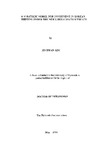A Strategic Model for Investment in Korean Shipping Under the New Liberalisation Treaty
| dc.contributor.author | Kim, Jin Hwan | |
| dc.contributor.other | Plymouth Business School | en_US |
| dc.date.accessioned | 2013-02-08T11:33:58Z | |
| dc.date.available | 2013-02-08T11:33:58Z | |
| dc.date.issued | 1999-05 | |
| dc.identifier | N/A | en_US |
| dc.identifier.uri | http://hdl.handle.net/10026.1/1281 | |
| dc.description | Merged with duplicate record 10026.1/1892 on 27.02.2017 by CS (TIS) | |
| dc.description.abstract |
Following trade liberalisation, shipping has been further affected by the world economic environment. Despite arguments as to whether the nature of the shipping industry is a liberalised one or not, it is now clearly seen as the case by the shipping industry itself. The primary goal of this thesis is to examine the attitudes within Korean shipping circles. An empirical study was carried out to evaluate how shipping is being influenced by liberalisation under the new rules, established by the World Trade Organisation and the Organisation for Economic Co-operation and Development. The null hypothesis was that there would be no substantial changes in Korean Shipping following liberalisation. The null hypothesis was rejected, which means that it was recognised by Korean shipping practitioners that there were significant changes after liberalisation. A further study was undertaken to test for relationships between the perspectives of four groups~ financial managers of shipping companies, bankers, government policy makers and sales managers from shipbuilding companies. It transpired that there was unity in their perceptions of shipping investment. A hypothesised seven-factor strategic model of the shipping industry was initially proposed and re-interpreted following the empirical results. To cope with the new competitive market, strategic options are likely to include tax and registry considerations. Finally, following the financial crisis in Korea last year, which occurred before this research was completed, interviews and a survey were conducted, based on a random selection of previous respondents. This was to establish whether their views had changed. The results revealed that they were now very hesitant to make any new investment decisions given the present situation. However, respondents are sure that there will be no further measures to impede the current liberalisation moves in Korea. Rather they regard this financial crisis as a mechanism to accelerate liberalisation, following the International Monetary Fund's options to dismantle the Korean protectionist barriers. | en_US |
| dc.language.iso | en | en_US |
| dc.publisher | University of Plymouth | en_US |
| dc.title | A Strategic Model for Investment in Korean Shipping Under the New Liberalisation Treaty | en_US |
| dc.type | Thesis | |
| plymouth.version | Full version | en_US |
| dc.identifier.doi | http://dx.doi.org/10.24382/1604 | |
| dc.identifier.doi | http://dx.doi.org/10.24382/1604 |
Files in this item
This item appears in the following Collection(s)
-
01 Research Theses Main Collection
Research Theses Main


